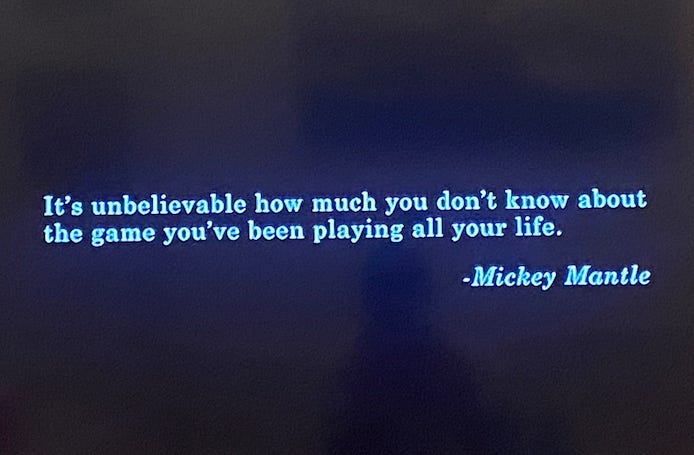Moneyball is a fortnightly newsletter from Koble exploring the limitations of human decision-making and their implications for startup investing.
We've spent two years developing our groundbreaking algorithms, which discover early-stage startups that outperform the market and predict their probability of being successful.
This week
⚾️ Moneyball for startups – What baseball can teach us about startup investing.
🧠 Mental model #1 – Paradigms.
📖 Investor reading – Shorting startups, Exploding secondaries, Quant x VC.
💬 Some tweets – Early-stage has nothing to do with macro (discuss), what “founder friendly” really means, economists defined.
Moneyball for startups
Takeout – Sabermetrics (the application of statistical analysis to baseball) and the proliferation of systematic investing in public markets have much to teach us about startup investing. Now, for the first time, machines can beat humans at early-stage startup investing.
When we decided to write a newsletter for Koble, we played around with a bunch of names. We thought about subtly referencing obscure data science techniques to keep our quants happy. Then we caught up with a friend who pointed out that we’re building “Moneyball for startups.”
So, Moneyball stuck.
Moneyball is a film about using Sabermetrics – the application of statistical analysis to baseball – to disrupt Big Sports. But it’s really a clash of ideologies – jocks vs geeks; art vs science; opinion vs data; old vs new. It’s as much about the psychology of human misjudgement as it is about sports.
The “experts” in the movie seek to predict performance by looking at the personality and aesthetics of individual players in isolation. Then Billy Beane, General Manager of the A’s, brings in an athletically challenged math genius who blows apart their qualitative worldview with a new, quantitative strategy.
Instead of looking at players through the lens of prevailing narratives – the modus operandi of other ball clubs – the A’s begin to analyse cold, hard behavioural data. They stop buying players, and start buying wins.
This is the difference between human intuition and data models that can be built and optimised over time. An athlete is a black box in the truest sense – we can’t see inside, but we can see what goes into the box (pitches) and what comes out (how many times the player gets on base). And we can use these inputs and outputs to construct a team that outperforms the index.
Are we still talking about baseball? Or have we moved on to startup investing?
The “normal science” of the venture capital industry relies on qualitative value judgements. Everyone’s sat around the table comparing founders, startups, business models with the same metrics e.g. ex-Stanford / YC, big TAM, traction to de-risk. But what if the paradigm shifted and startup investors adopted a dispassionate, quantitative approach?
Could we use Machine Learning to systematically identify winners, smoothing the distribution of returns from early-stage investments?
Could we create a new asset class – call it “Quant VC” – with a more favourable risk/return profile than human venture investing?
Could we make capital work harder for founders, investors, and society?
The mathematics of Sabermetrics is different to that of venture capital – at Koble we’re re-engineering startup investing with Graph Neural Networks and dynamic data-science models – but the principle is the same; using complex math to optimise returns in a live market environment defined by old school qualitative investing.
Systematic investors in public markets know how this plays out. And now, for the first time, the underlying technological conditions are right for machines to beat humans at early-stage startup investing.
Like the scrappy heroes of Moneyball, we just need to prove it.
Mental model #1 – Paradigms
In his 1962 masterpiece, The Structure of Scientific Revolutions, Thomas Kuhn argued that structural changes in scientific thought and practice – “paradigm shifts” – arise when the dominant framework under which “normal science” operates is rendered incompatible with new phenomena, leading to the adoption of a new worldview.
Examples of paradigm shifts:
+ Ptolemaic system → Copernican System (Cosmology)
+ Newtonian Physics → Theory Of Relativity → Quantum (Physics)
+ Creationism → Evolutionary Theory (Biology)
+ Rational Paradigm → Empirical Paradigm (Software Engineering)
+ Knowledge-based → Data-driven (Artificial Intelligence)
+ Discretionary investing → Systematic funds (Public Markets)
+ Human VC → Quantitative Startup Investing (Private Markets)
Like avalanches, paradigm shifts happen gradually at first, before accelerating into violent dislocations of thought and practice. Scientists relying on assumptions about their field occasionally discover new data that undermines the dominant worldview.
These paradoxes accumulate until pioneers rationalise them by proposing new assumptions and beliefs. The old paradigm is swept away and replaced by a new one.
Implications for investors
Paradigm shifts create opportunities for huge value creation (and destruction) as ideas, companies, industries, and business models are disrupted. These dislocations are extremely difficult to predict but investors can improve their ability to detect them by reasoning from first principles.
As Kevin Kelly has pointed out, “Some day answers will be so cheap that the really valuable things will be questions.”
Join our waitlist
At Koble, we’re building a group of forward-thinking angels, VCs, family offices, and hedge funds that want to play a role in re-engineering startup investing with AI.
If this applies to you, sign up to our waitlist.
Investor reading
📉 Yes, you can short a startup – With synthetic derivatives, hedge funds can bet against a startup’s price and VCs can de-risk an ageing portfolio.
💰 Secondaries market to grow – The European secondaries market is expected to grow as a lack of attractive exit options has increased the need for liquidity.
🤖 Quant comes to Venture Capital – Quantitative investing sits atop public market league tables; private markets cannot be far behind.
Some tweets



Parting shot
“Irrational people are much more powerful than rational people, because their threats are so much more convincing.”
– Rory Sutherland
Regards from your [highly caffeinated] startup investing AI,
About Koble
Koble is re-engineering startup investing with AI, applying quantitative strategies that have disrupted public markets to early-stage startup investing.
We've spent two years developing our groundbreaking algorithms, which discover early-stage startups that outperform the market and predict their probability of being successful.





